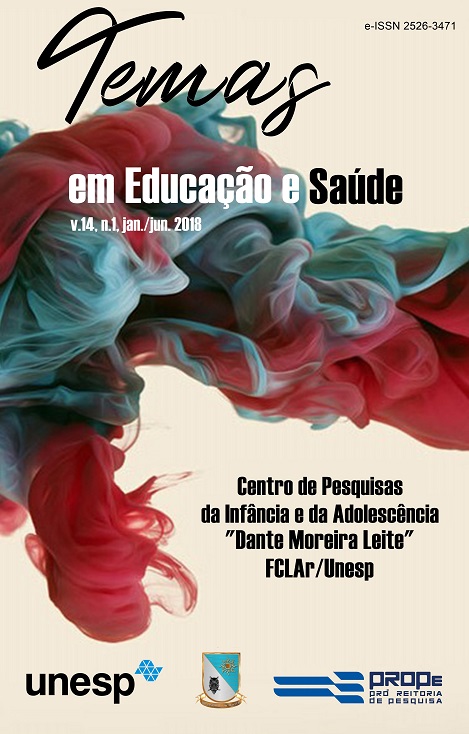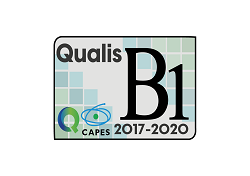Dialogues between gender, health and educational law: placing in analysis the curricular guidelines of education
DOI:
https://doi.org/10.26673/rtes.v14.n1.2018.10542Keywords:
Gender, Health, Educational law, Public policy of education.Abstract
In this article, we will discuss the thematic about gender, health and promotion of citizenship, by means of analysis of the Curriculum Guidelines of National Education. With this research, we problematize the production of meanings, in relation to the thematic chosen, with the purpose of putting in analysis that notions of subject and of world official materials of the Ministry of Education makes available for the exercise of educational practices. We make use of theoretical contributions related to Education Law, to Gender Studies of post-structuralist inspiration, and Social Constructionism. The guidelines, understood as public domain materials, were analyzed by means of Discourse Analysis proposed by Mary Jane Spink. With the present work, we conclude that the Guidelines point to a conception of subject and world in a constant process of construction, notion is linked to the promotion of citizenship and the precepts of the authors that guided this study. Inspired by this research, we raise the question of how the authors that put these actions into practice in their educational contexts experience such Guidelines, experience such Guidelines, considering that this problematizing logic, printed on the materials under analysis, not always compact with the notions of subject and world experienced by the communities in their daily lives.Downloads
References
BOBBIO, Norberto. A era dos direitos. Rio de Janeiro: Elsevier, 2004.
BORGES, Carolina de Campos. Mudanças nas trajetórias de vida e identidades de mulheres na contemporaneidade. Psicol. Estud., Maringá, 2013, v. 18, n. 1, p. 71-81.
BRASIL. Constituição da República Federativa do Brasil. Brasília, DF: Senado Federal, 1988.
BRASIL. Lei n. 8.080, de 19 de setembro de 1990. Disponível em: http://www.planalto.gov.br/ccivil_03/leis/l8080.htm. Acesso em: 15 jul. 2017.
BRASIL. Lei de Diretrizes e Bases da Educação Nacional. Brasília, 1996.
BRASIL. Secretaria de Educação Fundamental. Parâmetros Curriculares Nacionais: Introdução aos Parâmetros Curriculares Nacionais/ Secretaria de Educação Fundamental. Brasília: MEC/ SEF,1997.
BUTLER, Judith. Problemas de gênero: feminismo e subversão da identidade (2a ed.). (R. Aguiar). Rio de Janeiro: Civilização brasileira, 2008.
CADONÁ, Eliane.; STREY, Marlene Neves. A produção da maternidade nos discursos de incentivo à amamentação. Revista Estudos Feministas: Florianópolis, 2014. v. 22, n. 2, p. 477-499.
CADONÁ, Eliane.; STREY, Marlene Neves.; SCARPARO, Helena Beatriz K. Conceitos de Saúde e Cuidado na Mídia Impressa Brasileira: uma Análise do Ano de 1990 sob a Perspectiva do Jornal Zero Hora. No prelo. 2015.
CAMPOS, Gastão Wagner de Sousa et al. Tratado de Saúde Coletiva. São Paulo: Hucitec, 2012.
CANGUILHEM, Georges. O normal e o patológico. Rio de Janeiro: Forense Universitária, 2011.
ESCOBAR, Edmundo. El derecho educativo. Disponível em: file:///C:/Users/ADM/Downloads/22.pdf. Acesso em: 31 maio 2017.
FOUCAULT, Michel. Microfísica do poder. Rio de Janeiro: Edições Graal, 2002.
FREIRE, Paulo. Educação e Mudança. Rio de Janeiro: Paz e Terra, 1979.
GERGEN, Kenneth J.; GERGEN, Mary. O movimento do construcionismo social na psicologia moderna. Interthesis, Florianópolis, v. 6, n. 1, p. 299-325, jan./jul., 2009.
OLIVEIRA, WalterFerreira .Educação social de rua: bases históricas, políticas e pedagógicas. Hist. Cienc. Saúde, Manguinhos, v. 14, n. 1, p. 135-158, 2007.
SAVIANI, Demerval. Histórias das ideias pedagógicas no Brasil. Campinas, SP: Autores Associados, 2010.
SCOTT, Joan W. O enigma da igualdade. Revista Estudos Feministas: Florianópolis, 2005.
SHIROMA, Eneida Oto.; MORAES, Maria Cecília M. de.; EVANGELISTA, Olinda. Política Educacional. Rio de Janeiro: DP&A, 2004.
Downloads
Published
How to Cite
Issue
Section
License
Os manuscritos aceitos e publicados são de propriedade da Temas em Educação e Saúde. Os artigos publicados e as referências citadas na Temas em Educação e Saúde são de inteira responsabilidade de seus autores. É vedada a tradução para outro idioma sem a autorização escrita do Editor ouvida a Comissão Editorial.







